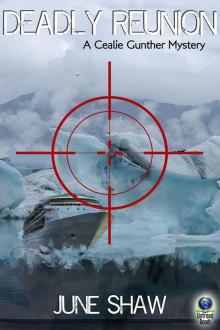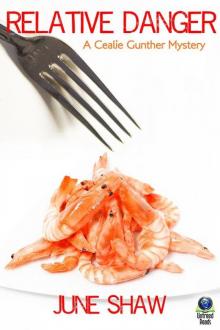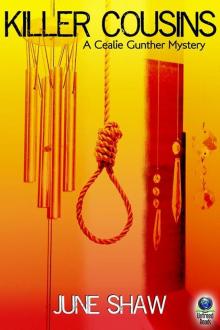Relative Danger Read online
Page 12
Rhomp, rhomp, rhomp sounded from the building. The hair on my neck sprang out. A new emergency?
“That was the all-clear horn,” Marisa said. “We need to go back inside.”
Youths whooped while returning up the stairs. Some jeered, saying whoever pulled the alarm needed to do it again so they could stay outside longer. “We need a bomb threat,” a girl said.
I spun around. Roxy had spoken. To my stunned expression, she lifted a shoulder and said, “Hey, we get those all the time.”
By the time I reached my room, Anne Little’s voice came through the speaker. “Everybody return to class. Get your books, then report to your next period.”
The students returning to my room griped. The interruption had disrupted their work, and they hadn’t had time to complete their practice worksheets.
“Take them home,” I said, happy to see them concerned. “I’ll leave Miss Fleet a note about the fire alarm. Good luck on your finals.”
The seniors thanked me, took their papers, and went out. I propped against the doorjamb for support. What new person or event would come to greet me now? What purpose would it serve a student who’d set off that fire alarm? And why, I wondered, watching Abby taking a stance outside her classroom, would sane adults want to do this?
I speculated about those who pursued the teaching profession today. If they knew what they were getting into, what was in their personalities that made them want to suffer? Did you actually think you could do some good? my thoughts asked Abby and all the teachers that I couldn’t see, but who were probably standing outside their doors. Are you a martyr? Or insane?
I peered at students shuffling into Abby’s room. Some shrieked with laughter, and big guys shoved each other’s shoulders. Only two or three of the young adults wore serious faces. So this is our future, I thought, my spirits further draining. I needed to bolster them.
Searching for positives, I recalled all that Kat had achieved during her school years. And I thought of those pleasant kids who’d come into this classroom today. My new ardor surprised me. There were some good teens. Many came seeking learning. Even those like Roxy showed up at school for something. Most of these youths were old enough to drop out if they chose to, but they stayed. Maybe those who behaved so badly were only experiencing a temporary period of instability.
Abby swooped into her room behind her final student. Her door slammed.
No one had come to my room. I took a breath, walked over to Abby’s door, and rapped on it. She shoved it open, and I said, “I don’t have any students.”
“You’re off now.”
“Off?” My enthusiasm soared. “I can leave?”
“Of course you can’t leave. It’s Fleet’s conference period. She’d meet with parents or plan lessons or grade papers.”
I was off! Parents? I’d like to meet some. I’d suggest what they could do with their kids. But some parents might not own chains.
I returned to my classroom, shut the door, peered across empty desks and science equipment, and welcomed the silence. Whoever created conference periods in the midst of teachers’ hectic days had done a wonderful job. Sitting on Miss Fleet’s chair, I folded my arms on her desk and dropped my head. I closed my eyes, trying to form absolute quiet in my brain. I needed to sort through what was happening. There was no Kat, my main problem. Why wasn’t she here?
I envisioned Marisa, apparently friendly and so tall. She might prove to have murdered the custodian, but Sledge’s murder-filled countenance entered my mind. Other faces crowded in. Coach Millet, always looking on the verge of killing someone. And Roxy cast a doubt about him and Abby, maybe connecting them? But Roxy also pulled a knife on Kat. Roxy and Anne Little both had scars. Miss Gird normally followed Coach. Did she teach with him, or maybe have a crush on him? Were they having an affair?
Someone I didn’t know could have done the killing. Or maybe Grant Labruzzo just leaned too far over the balcony rail and fell. The police seemed to believe that. Jayne Ackers, a sub, had been shot near her home. Coincidence?
My fingers rubbed circles on my forehead, and I squeezed my eyes tighter. I envisioned Gil. How I wished I could discuss all of this with him. Today was May third, and one thing was certain: I’d try to see him within a couple of hours. Heat spread through my body. I stopped it, reminding myself that he might not be there. Gil and the young woman with long legs surely had other plans.
I sighed, my knuckles massaging my warm eye sockets, and replaced Gil’s image with Roger’s. Such a sad picture. How excruciating to watch my son becoming a shell of a man without Nancy. I groaned, and tears soaked my fingers. We all loved Nancy, and I wished I could get her back, but couldn’t…Roger kept refusing counseling—but I could get some. Sure, I could go to a therapist and learn how to help him. I’d find one with really good credentials. Maybe I’d fly out and locate Dr. Phil.
Just one thing seemed absolute. Kat had to attend graduation, even if she missed exams and her average dropped to the bottom half of her class. She needed to walk across a stage for a piece of paper. For Nancy, for Roger, for herself.
Reputed experts, I knew, usually assured people that meditation was good for the soul, but my soul was aching, along with my head. It felt too heavy to lift.
A slight sound came from the door. Creaks told me it was opening. Chilly air in the room warmed. I anticipated a student saying she had forgotten something.
I wanted to look up, but a vague intuition told me to wait, listen. After all, there was some mystery to be solved here. And this moment felt mysterious.
The door rubbed against the floor’s vinyl. I could take only so much pondering. I lifted my head.
A change in air pressure came with the door’s slam. I jumped up and headed for the door. Behind me, glass shattered.
A picture had fallen, knocking a beaker off a shelf. Liquid pooled on the floor. Noxious fumes rose.
I grabbed the doorknob and found it slick, impossible to turn. Somebody had locked my door.
The spilled chemical on the floor clogged my nostrils, its vapor shooting a flood of tears to my eyes. I grabbed the doorknob with both hands and twisted. My palms burned, vision blurred. “Help! Help me!” I screamed, pounding on the door, an irritant raging in my lung and not letting me breathe.
The string. That dangling string. I rushed behind the teacher’s desk and pulled. “Somebody’s trying to kill me!” I yelled at the wall speaker. “Can anybody hear? Help!”
Chapter 12
Without pause, my door opened. I darted out the room, my arms flailing. I bent over and gasped, inhaling the hall’s nontoxic air.
John Winston stood holding my doorknob and grinning. Teenagers and teachers filled the narrow hall. A few people looked frightened for me, but most of the kids were laughing. Abby came, a big key ring in her hand. “What’s the problem here?”
“They tried to murder me! Somebody locked me in and tried to get me with poisonous fumes.”
She turned to John Winston. “How did you get her door open?”
He shrugged. “I just turned the knob.”
Abby swept in past me, ignoring my warning: “Don’t go in there. That room’s deadly!” She snatched up a shard of beaker glass. On part of its wet label I read sulfide.
“This isn’t toxic,” Abby said, her lower lip folding down, telling me maybe she’d have liked it to be. She ordered her students back to class and sent John to get a janitor with a mop bucket. “The smell won’t kill you,” Abby said, bangs flinging away with her head turn. I saw both of her eyes and they said You’re so stupid.
“They put that stuff in fart rocks,” a grinning boy said to me.
“Fart rocks?” I asked.
Abby ignored the teens’ snickers. “They’re little rocks that some kids throw down in the halls, and they smell like—” She scrunched up her nose.
Teachers beyond the laughing kids grumbled about me interrupting their reviews for final exams. “Some kid pulls the fire alarm and now this,�
� a well-dressed man griped. I spread my arms and opened my palms. Well what did I know?
A lot, I remembered. I knew much about human nature. Maybe I lacked knowledge about chemicals, but not about people. Someone had opened my door, peered in at me, and then slammed the door hard enough to knock down a picture and the beaker. Who that? And why?
My grandma used to talk about her step-ins. I paid particular heed to mine now, then recalled I wasn’t wearing any. I was pleased to determine that no dribble ran down my pantyhose.
Harry Wren came shouldering through the crowd. He stopped and calmly appraised me. “You had an emergency?”
I shook my head. “Not really.” He’d obviously come because I pulled that string and shouted at the office. He glanced at students standing around, and they started back toward their classrooms. An idea came. I said, “You’re a guidance counselor, Mr. Wren. Do you usually handle problems in the classrooms?”
His eyes looked like pinpricks in his tanned skin. “Tom Reynolds ordinarily takes care of—situations. But he didn’t come to school today.” People returned to classes, and Harry Wren left.
On instinct I questioned a student who was heading toward Abby’s room. “I imagine that I stopped Ms. Jeansonne from teaching your class some important material?”
“When you started yelling, she wasn’t even in the room. But she has a key that opens all the doors in this hall. She would’ve let you out—if you really would’ve been locked in.” The girl gave me a cocky smirk.
I could have given her fat cheek some firm pats. The child was intelligent enough to go away.
What do you do when you believe someone’s just tried to kill you? I considered, standing alone, my arms stopping their quiver and my pulse slowing.
I decided. Eat lunch. My belly made little squeals, and I headed for the cafeteria. Food from Cajun Delights could later become a mid-afternoon snack.
The halls no longer seemed a maze. I knew exactly where to locate the room emitting pepperoni smells. I could eat a good pizza. Would they have mushrooms and black olives?
A sign taped to the door said Closed. I hit the door and tried to shove it open. I’d rustle up at least one slice of pizza, even if it was only plain. But the cafeteria was locked down. I yanked my cell phone from my purse. I’d have a pizza delivered. Lots of black olives. Pile on the mushrooms.
I pressed zero for Information, reconsidered, and clicked off. The school day would soon be over. I’d wait. Then I could go ahead with my plans to eat at Gil’s place. It seemed that I was supposed to do something else right after school, but I couldn’t recall what. I tossed Tic Tacs in my mouth and turned away from the cafeteria.
The auditorium doors stood in front of me. Tension squeezed through my upper abdomen. I didn’t want to look in that room. Grant Labruzzo died in there.
Nobody else was in this hall.
I stepped across, fighting the sudden urge to go to the restroom. I clasped a door handle and yanked. The door opened.
Total darkness swelled. I tiptoed inside, keeping a hand on the door to keep it from closing all the way. I couldn’t see a light switch. It was probably hidden so that students wouldn’t flick the lights off and on. A hollowed quiet reverberated. I could make out a short flight of stairs leading to a landing. A wall flanked an open door there and probably beyond that was a huge space that held many seats. A podium in front. And up above me, a balcony. I could go all the way in and try to determine where Grant Labruzzo fell.
I needed to go to the restroom. There was no way I was going up near a balcony. And in the dark? Two scares today had been enough for me. I backed out the room, went to the restroom, and took care of my bladder.
Cynthia Petre was the sole person in the office’s outer area when I reached it. She sat at her desk and muttered, staring at her monitor and punching computer keys. Miss Gird hurled herself in from the corridor and ranted to Petre. I passed them and entered the rear administrative hall. A clipping of the death notice was still posted near a door. I stopped to read.
Grant Labruzzo, originally of Coral Gables, Florida, had been only thirty-seven when he died. How horrible to lose someone so young. He was survived by two brothers but neither parent. Gosh, they’d died young, too. Labruzzo’s wake had been brief, from eight until ten in the morning at All Believers’ Church, followed by the service.
He’d lived near Marisa Hernandez, Abby told me. Maybe this evening I could ride by their houses and discern some connection.
I returned to the outer office. Miss Gird was gone, but other secretaries had returned to their computers past Cynthia Petre’s. They carried scents of roasted chicken, which I imagined they’d just eaten. My stomach growled. Petre glanced at it.
“May I use your phone book?” I asked.
I reached for it, but she lifted the book and handed it to me. “Here.”
I turned so no one could see where I looked and searched for a listing for Grant Labruzzo. Bunches of L’s. Not even one Labruzzo. Most staff members here probably had unlisted numbers, and I didn’t blame them. I wouldn’t want some of the students I’d met knowing where I lived.
Cynthia Petre stared at me, her wire-bound teeth not showing. She held out a hand.
“Thanks,” I said, shutting the phone book. She snatched it from me and carefully set it down behind the frame holding John Winston’s photo.
I returned to the rear hall and skimmed words on the obituary, then stared at the picture. Such a handsome young man. Sincere eyes and a trace of what his full smile must have looked like. A head of thick dark hair. A lost future.
Cynthia Petre bumped into me. She’d come from the office. “Oh, you backed up when I was passing.” She turned toward where I’d been staring and peered at Grant’s picture. Strangely, moisture coated her eyes.
“Did you know him well?” I asked.
She glanced at me. “Grant was a friend.” She started away, and I walked with her.
“That’s a nice shade on you,” I said, nodding toward her brown blouse. “It highlights your rosy complexion.” Her lips had been tight, but they drew apart, her smile revealing the braces. I returned the keys she had given me. “I won’t need these anymore.”
She slid them into her skirt pocket and brushed at a blue smudge near her waistline. “Somebody left an open pen on the edge of my desk, and I rubbed against it.”
“School must be the place to get lots of smudges,” I said with a grin.
Petre looked at me with no expression. She turned and entered the administrative restroom. Tiny Miss Gird came out.
“My granddaughter is in your class,” I said.
“What’s her name?”
My chest swelled. “Katherine Gunther.”
Miss Gird’s eyes seemed to lose their vision while she apparently did a mental roll call. “Oh yes. Second period, third row.” She strode away.
“Kat’s been a great student,” I told her skinny backside.
“All of my students are.”
Not according to your fury, I wanted to tell her. But I didn’t need to get any of Kat’s teachers angry with her now. What I really wanted was to hear bragging about Kat. I needed to know what would keep her in school these final days. Continuing down the hall, I glanced in Hannah’s office. She was holding a phone, waiting for someone. I poked my head in. “Do you get to see Kat often?”
“Every once in a while.”
“She is a good student, isn’t she?”
“All teachers wish they had classes full of students like Kat.”
I stood, letting pride fill me. Hannah replied to someone on the phone, and I ambled down the hall, glancing in rooms with open doors. Adults worked their computers, with papers and files spilling across their desks. A few unhappy teens filled their extra chairs.
All these inner workings appeared foreign, yet similar to my recollections that these rooms evoked. Ceilings had been higher when I was a child, with dark wooden desks and doors and wall panels. The changing times had brought
new schools, modern equipment, and maybe more knowledge. One thing I definitely would’ve wanted to see retained was the respect that all kids showed when I was a student.
“Minnie!” I cried, spying my cactus in an office.
The light was on, the door open, the room vacant. I walked in.
“May I help you?” The man who entered behind me wore a suit. He appraised me when I turned and then said, “Oh, you again.”
“I’m Cealie Gunther. Yes, Mr. Wren, you came to my class when I pulled the string. And we met yesterday when you were on duty in the hall.”
“Guidance counselors don’t pull duty,” he said as though I’d insulted him. “I was just coming from lunch and stopped to talk to the students.”
Or scare them? He’d been carrying that heavy spirit stick.
“I thought this cactus was mine.” I touched the plant with a pink head that sat on a wall shelf lit by spotlights. The cactus stood amid a grouping of others. Clay pots held individual cacti. Bowls held assortments. Some spindly cacti had ridges, short scaly ones had minute flowers, and some plants with circular leaves bore spears.
Harry Wren admired this assemblage.
“But this plant’s not exactly like Minnie,” I said. “I see it has three of these pink poufs around its head. Minnie has five.”
“They might have any number of these tufts.” Wren placed a hand gently on the plant.
“Those things make me think of sponge hair rollers,” I said.
He didn’t seem to hear my words. Harry Wren stroked his cacti, one after the other, almost like a parent might do with a newborn. But he had bunches of them.
“These plants are easy to grow,” I mentioned.
“Yes, but they need the right conditions. The proper soil. Container. Nourishment.”
“But if one of them is already in a pot from the nursery, all you have to do is dump water on it sometimes, right?”
“Oh no! You need the right proportions of everything. And never just dump water. And not often. Too much would kill it.”
Uh-oh. I wouldn’t dare ask what ailment cranberry juice might create.

 Instructions for Love
Instructions for Love A Fatal Romance
A Fatal Romance Deadly Reunion
Deadly Reunion A Manor of Murder
A Manor of Murder Relative Danger
Relative Danger Approaching Menace
Approaching Menace Killer Cousins
Killer Cousins Dead On the Bayou
Dead On the Bayou